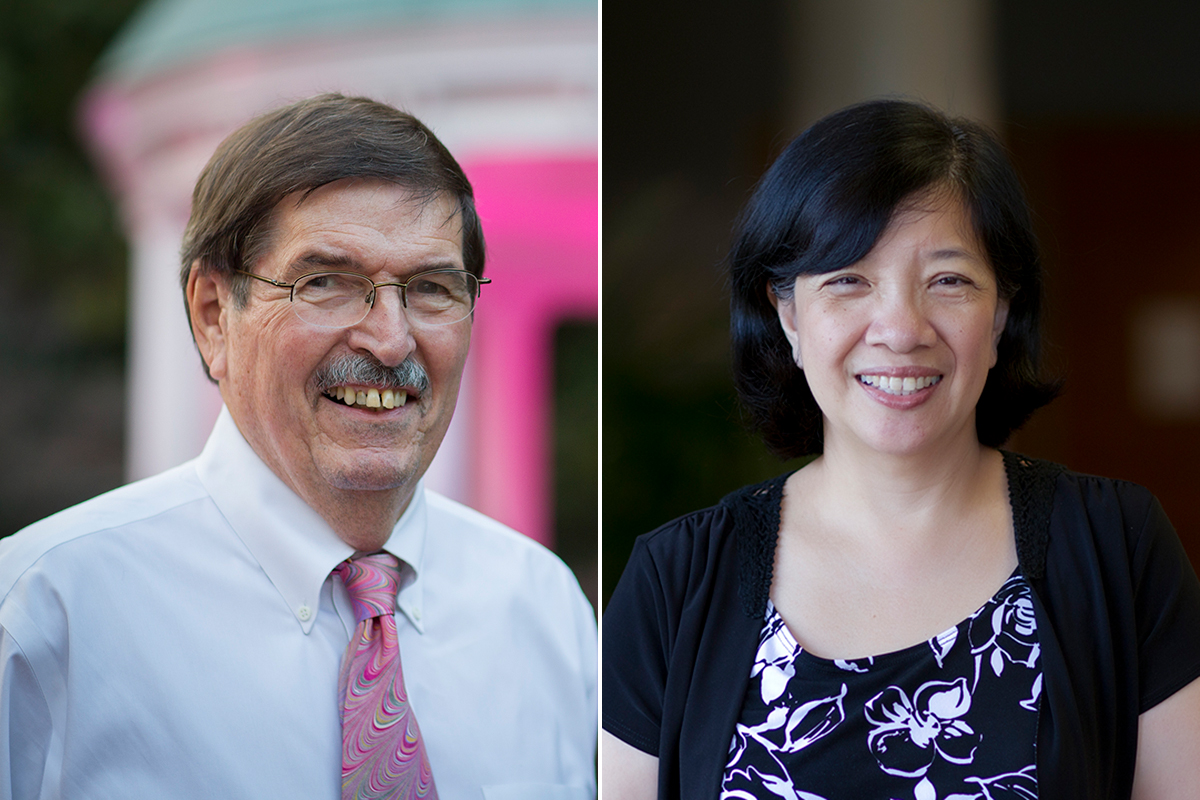UNC Lineberger’s H. Shelton Earp, MD, director of UNC Cancer Care and the Lineberger Professor of Cancer Research, and Jenny P.Y. Ting, PhD, the William Rand Kenan Professor of Genetics, have been honored with the Hyman L. Battle Distinguished Cancer Research Award.

The UNC School of Medicine has recognized two UNC Lineberger Comprehensive Cancer Center scientists for cancer research excellence.
H. Shelton Earp, MD, director of UNC Cancer Care and the Lineberger Professor of Cancer Research, and Jenny P.Y. Ting, PhD, UNC Lineberger member and the William Rand Kenan Professor of Genetics, were presented with the Hyman L. Battle Distinguished Cancer Research Award at a well-attended reception held in the UNC Lineberger Building atrium.
“We are proud to be able to recognize two people who both have made exemplary contributions to science, and have also helped to develop this institution and its people,” said UNC Lineberger Director Norman E. Sharpless, MD.
The award was created in 2007 by the Battle Foundation of Rocky Mount. The foundation was established in 1946 by Hyman L. Battle (1896-1972), a UNC alumnus from 1914-1916 who went on to a career in business, education and as a civic leader.
Blossom Damania, PhD, vice dean for research in the UNC School of Medicine, the Boshamer Distinguished Professor in the Department of Microbiology and Immunology and a UNC Lineberger member, presented the award to Earp.
Damania has known Earp since 1999, when she was interviewing for an assistant professorship at the UNC School of Medicine. She commended Earp for his work cutting across basic and translational science, as well his ability to know “everything and everyone,” as he was growing cancer research excellence at UNC Lineberger.
Earp earned his bachelor’s degree at Johns Hopkins University and his medical degree from the UNC School of Medicine, where he started his training as both a physician and a scientist. He completed an internship at Vanderbilt University, and then served in the U.S. Army for three years as a captain in the Medical Corps. He returned to UNC-Chapel Hill with his new wife, Jo Anne Earp, ScD, UNC Lineberger member and professor of health behavior in the UNC Gillings School of Global Public Health, for his medical residency and fellowship. At UNC Lineberger, he began first as a faculty member, and then rose through the ranks at the center into the role of associate director, deputy director, and then director. He has helped recruit and mentor hundreds of researchers across the basic, population and clinical sciences.
Highlighting his work in cancer research, Damania spoke of Earp’s studies of interactions between a receptor called EGFR and certain cellular signals, as well as the key discovery by his lab of a protein signal called MERTK. As a result of this discovery, Earp and his collaborators have co-founded a company in order to develop an investigational compound that targets MERTK, which can become dysregulated in certain cancers.
At the national level, Earp has helped shape the future of cancer research as a member of multiple national boards, including for the National Cancer Institute, American Association of Cancer Institutes, the V Foundation for Cancer Research, the Burroughs Wellcome Fund, and the American Cancer Society, Damania said.
“Shelley Earp is a stellar scientist who investigates the underpinnings of the cellular transduction machinery. He discovered the receptor tyrosine kinase Mer, and has been studying the function of closely related tyrosine receptors as well,” Damania said. “Shelley has been an invaluable and tremendous asset to cancer research at UNC Chapel Hill and beyond. We are most fortunate to have Shelley as part of our community. ”
Sharpless, in presenting the award to Ting, cited her as one of UNC’s best known scientists. Working in the field of immunology, Ting has achieved distinction in the study of the body’s innate immune system, which signals the rest of the immune system when a threat is detected. In addition to conducting research, Ting is the co-director of the Inflammatory Diseases Institute and director of the Center for Translational Immunology.
Ting earned her doctorate at Northwestern University in 1979 and completed postdoctoral research at the University of Southern California and at Duke University. She joined the UNC faculty in 1984 as an assistant professor and rose through the ranks, becoming a full professor in 1993. She has studied genetic and molecular mechanisms behind immune system development for more than three decades at UNC-Chapel Hill.
Her early work at UNC-Chapel Hill involved research into the regulation of genes that code for cell-surface proteins that can trigger T-cells. She and her collaborators discovered DNA promoter sections that turn on downstream genes coding for the cell-surface markers that activate T-cells. Her lab also characterized a family of proteins called NLRs that help regulate the immune system. Those proteins can boost the immune system’s inflammatory response. Changes in the genes that code for those proteins, Ting said, can lead to inflammatory diseases and other problems.
“It’s really inspiring and awesome discoveries,” Sharpless said, adding that in addition to her role as a researcher, she has also trained generations of scientists.
Among her many honors are her selection as the Berryhill Lecturer in 2010, the University Award for the Advancement of Women and the American Association of Immunologists Life Technologies Meritorious Award in 2013, the NIH Director’s Lecturer in 2014, and election to the Academia Sinica Taiwan and the Henry Kunkel Society in 2015.
